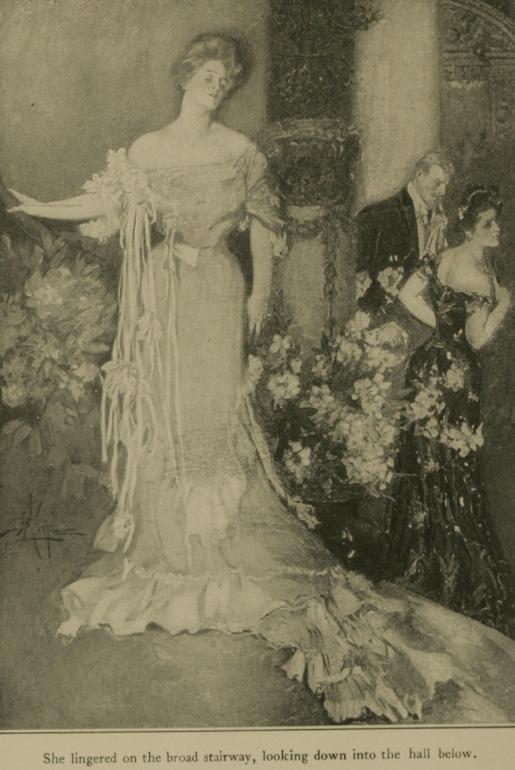One more shorter reading--there has been a little series of them here. Long more celebrated in this country at least in its operatic incarnation, surprisingly few English editions of this play have been published in the last century, apart from a Penguin edition that gets reprinted from time to time. The only old hardcover copy of the sort that I like to collect that I could find was a book from the 1893 Heath's Modern Language Series, an American school book that has the play in French, with an introduction and extensive notes in English. As the play runs only 83 pages, the language is mostly classical (and therefore consistent and unconfusing) French, the notes are directed at readers whose reading level in that tongue is not more advanced than my own, and as I often find English translations of pre-revolutionary French plays to be unsatisfying, I decided to read it in the French. On the whole this was successful; reading over the summary in the IWE the only major plot point that escaped me was that Bartholo was persuaded in the end to agree to give up Rosina so easily because it was suggested that as her guardian there might be an investigation into what had become of her property. I am not sure why I missed that, because it is not an obscure or difficult passage. Perhaps I was tired or otherwise distracted by that point (it was on the second to last page) and it failed to sink in.
From the IWE introduction, which I confess I am not sure makes any sense:
"The Barber of Seville is now best known in the history books (?), though it was only a symptom and not a contributing factor in the last mad years of the French kingdom."
It's a jolly and entertaining play, great construction, compares favorably with the better English comedies of the Restoration and 18th century, which I also have derived some enjoyment from in the course of my life. Unlike everything else I have been reading lately, there is nothing in this that I can interpret as being about death. It is concerned neither with the past nor the future, but entirely with present action. Figaro is one of those characters of the European tradition whose existence maintains, or did maintain, a sort of universal present and freedom from most of the bounds and constraints that even afflict literary inventions. It contains a humor that seems to me to take much more after the English manner than what is usual in French writing. Its quality is that of being humorous without being over-serious, which has always been a source of much charm in English literature, though not a quality that I have found much elsewhere.
I only took a few notes on this, lines that I found amusing, though they may not work taken out of context. The translations are my own.
My cute little book.
Act II, scene XIV:
LE COMTE: Elle est votre femme? (Is she your wife?)
BARTHOLO: Et quoi donc? (And what of it?)
LE COMTE: Je vous ai pris pour son bisaieul paternal, maternal, sempiternal; il y a au moins trois generations entre elle et vous. (I took you for her great-grandfather, paternal, maternal, eternal; there are at least three generations between her and you).
Act IV, scene I:
BARTHOLO: ...Il vaut mieux qu'elle pleure de m'avoir, que moi je meure de ne l'avoir pas. (It is better that she cries in having me, than that I die of not having her).
Act IV, scene VII:
LE COMTE: Mon maître Bazile, un rien vous embarrasse, et tout vous etonne. (My master Bazile, nothing embarrasses you, and everything astounds you).
Act IV, scene VIII: (an example of the tone of the play's humor)
BARTHOLO voit le comte baiser la main de Rosine, et Figaro qui embrasse grotesquement don Bazile; il crie en prenant le notaire a la gorge. Rosine avec ces fripons!... (Bartholo sees the count kissing the hand of Rosine, and Figaro, who is grotesquely embracing Don Bazile; he shouts in grabbing the notary by the throat. "Rosine, with these rascals!")
From one of the footnotes: "...the excellence of this comedy resides in the acuteness with which Bartholo sees through the devices of his enemies, who have all the harder a task to outwit them."
I believe this is now the second French language book to appear in this program, after Around the World in Eighty Days. While it is exciting to be finally starting to encounter some of the classics of this great tradition almost five years in, it is somewhat funny to consider that we have still to encounter a book written in French that is actually set in France or features nominally French characters. There is not anything especially Spanish about Figaro or the other characters in the Barber of Seville I suppose, though they do not seem to be intensely French either. They have a kind of all purpose continental Latin-derived quality about them. There have been a number of American books thus far with Parisian settings, The American, Alice B. Toklas, part of Anthony Adverse; so we have not had to do entirely without Paris, at least, though it is of course a different kind of Paris.
The Bourgeois Surrender Challenge
Decent Challenge this time, heavy on opera books and antiquities.
1. Lucy Lethbridge--Servants: A Downstairs History of Britain, etc.......................83
2. Leah Kaminsky--The Waiting Room....................................................................40
3. Louis Sachar--Marvin Redpost #4: Alone in His Teacher's House......................31
4. Gustav Kobbe--The Complete Opera Book..........................................................21
5. Charles Osborne--The Opera Lover's Companion.................................................8
6. Pierre Caron de Beaumarchais--The Marriage of Figaro......................................3
7. Honore de Balzac--About Catherine de Medici, Seraphita and Other Stories.......3
8. Benjamin Disraeli--The Young Duke......................................................................1
9. Thomas Hood--Poetical Works of...........................................................................1
10. Rosina Bulwer-Lytton--Cheveley..........................................................................0
11. John Cordy Jeaffreson--The Real Shelley..............................................................0
12. Mabel Wagnalls--Stars of the Opera.....................................................................0
Qualifying Round
#5 Osborne over #12 Wagnalls
Availability
#6 Beaumarchais over #11 Jeaffreson
#7 Balzac over #10 Bulwer-Lytton
#9 Hood over #8 Disraeli
Very close contest. The New Hampshire State Library has both of these books, but the Disraeli is too old to circulate. Also I have read a Disraeli novel before (Vivien Grey) and it did not instill in me any great desire to go deeper in his oeuvre.
Quarterfinals
#1 Lethbridge over #9 Hood
#7 Balzac over #2 Kaminsky
I actually thought Kaminsky might take this one, but her book has not broken through to the libraries (and maybe never will).
#3 Sachar over #6 Beaumarchais
One of those pesky tournament upsets, and over Beaumarchais, who is essentially the host. We have Sachar's famous young adolescent book Holes in our house, and my impression is that at least one of my children has actually read it, so I am not disinclined to see him advance.
#4 Kobbe over #5 Osborne
Epic battle of Opera guides.
Semifinals
#1 Lethbridge over #7 Balzac
The power of the seed and the upset are too great for even the awesome Balzac to overcome here. I'm sure we'll see Honore in the tournament again.
#3 Sachar over #4 Kobbe
Championship
#1 Lethbridge over #3 Sachar
In the end, I want to stick with an adult book on a somewhat different topic than what I have been taking up lately.










